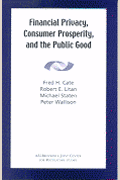American consumers have become accustomed to obtaining instant credit. The process requires that credit bureaus have easy access to sensitive financial information about individuals, compiled largely without their consent. This report examines the debate surrounding the role of the states in regulating these credit bureaus, especially in light of expiring amendments to the Fair Credit Reporting Act, which have allowed bureaus to continue these practices, exempting them from state laws that might obstruct them. How this controversy is resolved will have an important bearing on credit markets and financial privacy in the future. The authors make the case for continued federal preemption of the states in this area. Without it, the authors argue, the consumer credit system has developed in the United States would be put in jeopardy.
Authors

Fred H. Cate is professor of law and Ira C. Batman Faculty Fellow at the Indiana University School of Law, Bloominton, and is a visiting scholar at the American Enterprise Institute. Robert E. Litan is a senior fellow in Economic Studies at Brookings and vice president for research and policy at the Kauffman Foundation. Michael Staten is director of the Credit Research Center at the McDonough School of Business, Georgetown University. Peter J. Wallison is resident fellow and codirector of the Program on Financial Market Deregulation at the American Enterprise Institute.
